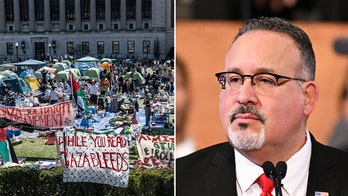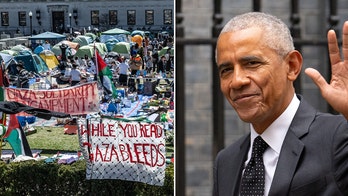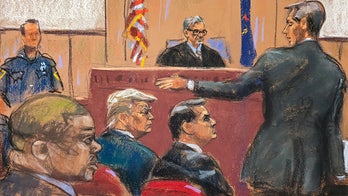"We only have one president at a time."
That's what Barack Obama said in his first press conference after defeating John McCain on Nov. 4. But in the four weeks since he became president-elect, the omnipresent Obama has taken the lead -- and some say the reins -- from President Bush.
Presidential historians and political analysts say they cannot recall a time in the past 75 years when a president-elect has had so large a role as Obama, whose growing transition team often appears more prominent than the actual team in power.
"There is really only one de facto president, and we finally have accepted that -- that it's Obama," said FOX News contributor Fred Barnes, executive editor of the Weekly Standard.
Obama has made great theater of his Cabinet appointments, setting up a shadow government to rival the president's team as he prepares to move into the White House on Jan. 20.
As Bush dispatched Secretary of State Condoleezza Rice to India to address the terrorist attack in Mumbai, Obama announced his nomination of Sen. Hillary Clinton to succeed her on Monday at his fifth press conference since the election. No president-elect has held so many briefings during a transition. The last three presidents-elect held that many -- combined.
Obama has already prepared the trappings of his office -- including an official placard and seal of the president-elect -- though it is purely ceremonial. Legally, he has no authority prior to his inauguration.
But even before assuming power, Obama has faced some of the tests of his office. He may be the most active president-elect since Franklin Roosevelt, who entered office in 1933 after a stock market crash and amid an economic catastrophe.
"I think it really is a reflection of the times," said Norman Ornstein, a resident scholar at the American Enterprise Institute, arguing that Obama has been forced by circumstances to step up his role in managing the financial crisis.
"Normally presidents-elect try to avoid getting into policy, stepping on the toes of the president who's there. That's how Obama started," he said. "It's changed, and I think the main reason for the change is the market tanking" in mid-November.
Markets tumbled when Treasury Secretary Henry Paulson said he planned to leave half of a $700 billion federal bailout package to the Obama administration, spelling months of financial insecurity as some $350 billion sat in limbo.
He later relented on that promise, and markets soared when Obama announced the appointment of an experienced team of economic advisers -- including President of the Federal Reserve Bank of New York Timothy Geithner and former Secretary of the Treasury Lawrence Summers -- whose presence ensured continuity and reassured markets.
"In this particular time of financial crisis, it's a good thing that Obama is calming the markets and the public, showing that he's amply preparing to take over," said Larry J. Sabato, director of the University of Virginia's Center for Politics.
His prominence has less to do with the enormity of his challenges abroad, Sabato said. Though Obama enters office in wartime, none of his martial presidential predecessors were as visible in the months leading up to their inauguration.
"Even during wartime in '52-'53 (as Dwight D. Eisenhower inherited the Korean War) and '68-'69 (when Richard Nixon took office during the Vietnam War), the incoming presidents were very quiet during the transition," Sabato told FOXNews.com.
Some observers in Washington say Obama's prominence is a result of Bush's near invisibility of late. While Obama proclaimed the strength of Indian democracy in the face of last week's terrorist attacks in Mumbai, Bush was abroad in Peru on a valedictory trip to a financial summit in Latin America.
"Usually a president doesn't abdicate before January 20," said Stephen Wayne, professor of government at Georgetown University. "I think [Obama] is trying to fill in the vacuum."
Despite his decreased role, Bush has been congenial during this period of Obama's ascendancy, said Sabato. "I don't think he's upset in the slightest -- Obama just carried forward his agenda. My guess is when the history of this interregnum is written we're going to find out a lot of cooperation was going on between these administrations," he said.
Ornstein said this transfer of power has been an unusually smooth one, as both sides realized the stakes of the handover.
"You don't have the normal nitpicking or jealousy or proprietary kind of behavior from an incumbent president," said Ornstein. "[Bush] understands some critical policy decisions are going to be made in the next two months and he wants to make sure the outgoing and incoming administrations' policies are in sync. The consequences of failure are just too great."




